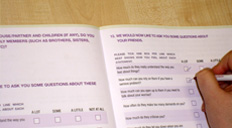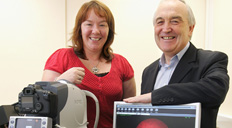What is involved?
There are three components of participant involvement in TILDA: a personal interview, a self-completion questionnaire and a detailed health assessment. Participants will have a follow-up interview every two years and a health assessment every four years.
Computer-Assisted Personal Interview (CAPI)

In each Wave of the TILDA study, participants first complete a face-to-face personal interview in their own homes. The interview is arranged for a time that suits the participant, and is carried out with the aid of a laptop computer by a trained, experienced interviewer from Behaviours & Attitudes (B&A), who carries photo ID. The local Gardaí will also know that the study is ongoing in their area.
During Wave 6, we adapted the CAPI and conducted a Computer-Assisted Teleohone Interview (CATI), in direct response to COVID-19 protocols in place at the time.
Self-Completion Questionnaire (SCQ)

In each Wave of the study, once the participants have finished the face-to-face interview, the interviewer leaves the participant a short questionnaire. Participants can fill out the questionnaire in their own time and have the interviewer come back and collect it, or it can be posted back to us in the stamped addressed envelope provided.
Health Assessment

Every four years, after carrying out the face-to-face interview and the self-completion questionnaire, participants are invited to attend our health centre at Trinity College Dublin for a health assessment. The assessment is arranged at a time and date that suits the participant and is carried out by qualified healthcare professional. The whole assessment takes between 2 and 3 hours.
In waves 2, 4 and 5, no separate health assessment was conducted. Instead, brief assessments of hand grip and mobility were captured as part of the CAPI.
Wave 6 Health Assessments are currently underway, which will give our researchers the first opportunity to conduct more complex longitudinal analysis of objective health assessment data.

